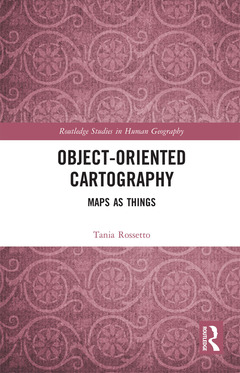Description
Object-Oriented Cartography
Maps as Things
Routledge Studies in Human Geography Series
Author: Rossetto Tania
Language: English
Subjects for Object-Oriented Cartography:
Keywords
Claes Jansz Visscher; Istituto Geografico Militare; Waterton Lakes National Park; Wall Hangings; Hereford Mappa Mundi; Sat Nav; maps as objects; OOO; mapping; Cartographic Objects; critical catrography; Cartographic Field; object oriented; Wayfinding Tool; Object Oriented Cartography; Post Representational Cartography; Object Oriented maps; Gps Device; maps as things; Vice Versa; tania rossetto; Luigi Ghirri; visual culture; Repeat Photography; object-oriented ontology; Non-human Narration; speculative-realist map theory; Gps System; image theory; Hereford Map; cartographic study; Caitlin DeSilvey; Animated Image
Publication date: 12-2020
· 15.6x23.4 cm · Paperback
Publication date: 05-2019
· 15.6x23.4 cm · Hardback
Description
/li>Contents
/li>Readership
/li>Biography
/li>
Object-Oriented Cartography provides an innovative perspective on the changing nature of maps and cartographic study. Through a renewed theoretical reading of contemporary cartography, this book acknowledges the shifted interest from cartographic representation to mapping practice and proposes an alternative consideration of the ?thingness? of maps.
Rather than asking how maps map onto reality, it explores the possibilities of a speculative-realist map theory by bringing cartographic objects to the foreground. Through a pragmatic perspective, this book focuses on both digital and nondigital maps and establishes an unprecedented dialogue between the field of map studies and object-oriented ontology. This dialogue is carried out through a series of reflections and case studies involving aesthetics and technology, ethnography and image theory, and narrative and photography.
Proposing methods to further develop this kind of cartographic research, this book will be invaluable reading for researchers and graduate students in the fields of Cartography and Geohumanities.
Introduction: layers of map thinking; 1. (Re)Turning to cartographic things; 2. From object-oriented ontology (OOO) to map studies, and vice versa; 3. Stretching theories: cartographic objects, map acts; 4. To rest on cartographic surfaces; 5. Learning from cartifacts, drifting through mapscapes; 6. The productive failures of literary cartographic objects: the father, the son, The Road, and the broken map; 7. The gentle politics of non-human narration: a Europe map’s autobiography; 8. Pictured maps, object renderings and close readings; 9. Animated cartography, or entering in dialogue with maps; 10. Maps vis-à-vis maps: (in-car) navigation, coexistence and the digital others; 11. Re-visitations at cartographic sites: the becomings and ‘unbecomings’ of maps; 12. Conclusions
Tania Rossetto is Assistant Professor of Cultural Geography at the University of Padova (Italy). Her research interests include the relationship between map studies and visual studies, the embodiment of maps, the ethnography of mapping practices, the portrayal of maps, cartography and racial/ethnic otherness, and the use of visual ways to display cartographic research. She has also worked on the linkage between cartographic theory and literary studies, and in particular on literary geovisuality. On these subjects she has published in journals such as Progress in Human Geography, Social & Cultural Geography, Environment and Planning D: Society and Space and Cartographica.




